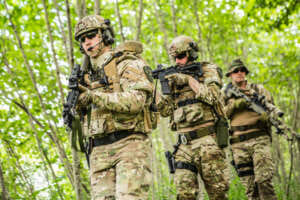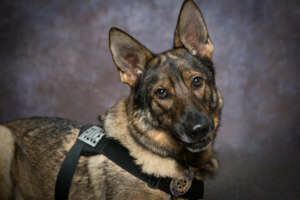JPD Special Operations
The Airport section is supervised by a Police Sergeant and when JPD is fully staffed will include 4 sworn officers. JPD’s role is to perform all law enforcement functions at the Juneau International Airport. The Airport-assigned officers provide an initial response to all law enforcement issues at JIA and often coordinate efforts with other agencies such as TSA and the Federal Air Marshall.
 The Special Weapons and Tactics (SWAT) team is comprised of many well-trained police officers with the mission to save lives. Their training is based on saving the lives of the citizens in our community whose security is threatened and the lives of law enforcement personnel who become faced with unusually hazardous situations. The team trains regularly in an effort to perfect their weapons skills, their tactics to resolve the high hazard incidents, and their physical fitness level. SWAT deployment situations include, but are not limited to the following:
The Special Weapons and Tactics (SWAT) team is comprised of many well-trained police officers with the mission to save lives. Their training is based on saving the lives of the citizens in our community whose security is threatened and the lives of law enforcement personnel who become faced with unusually hazardous situations. The team trains regularly in an effort to perfect their weapons skills, their tactics to resolve the high hazard incidents, and their physical fitness level. SWAT deployment situations include, but are not limited to the following:
- High hazard search and arrest warrants
- Barricaded suspects
- Hostage situations
- Dignitary protection
- Any mission requiring a tactical team effort including organized searches for subjects involved in criminal activity.
 The Juneau Police Department is proud to have one drug detection dog, Buddy. K9 Officer Michael Wise selected Buddy in May 2015 from a training center in Alabama. Officer Wise and Buddy went through a rigorous training program and then came back to JPD where Buddy works regularly by Officer Wise’s side.
The Juneau Police Department is proud to have one drug detection dog, Buddy. K9 Officer Michael Wise selected Buddy in May 2015 from a training center in Alabama. Officer Wise and Buddy went through a rigorous training program and then came back to JPD where Buddy works regularly by Officer Wise’s side.
Frequently Asked Questions:
- Where do the Police Service Dogs live? Do you take Buddy home with you? The dogs are taken home with their handler, where they sleep in a kennel. The dogs are our complete responsibility. Not only do we take them home with us, we feed them, bathe them, exercise them, and give them lots of love!
- Can I touch/pet Buddy? Like any service dog, you must ask the handler if you can pet Buddy before you do. Police service dogs are trained to protect themselves and their handlers, so it’s important the handler introduce you to his or her dog properly.
- How old will Buddy be when he can retire? Ideally, we would anticipate the service life of Buddy to be until the age of 8 or 9 years old. However, this age depends on many things. The daily job of a police K9 requires strenuous physical activities such as running and jumping over 6 foot walls. If a police K9 is sick or injured and cannot carry out the day-to-day job functions, the handler and department must make a decision to retire the K9.
- Where does Buddy go when he retires? Police service dogs are members of the officer’s family and they retire with that family in every case. If a service dog has worked with more than one officer during its career, the dog normally retires with the last officer that it worked with.
- How much do police service dogs cost? The dogs that meet the high standards start around $10,000 including specialized training. Fortunately, when measured in terms of effectiveness and community safety, the payback period on the initial investment is very short!
- What does Buddy do when he’s home? Many of the dogs are like us when we’re off duty. Their first day off, they simply want to rest and relax. Once the dogs have had some good sleep to recover from their long week, some handlers like to take them jogging, hiking or for nice walks around their neighborhood (since the dogs are expected to maintain a certain level of physical fitness).
- How is Buddy able to smell so well? A number of things contribute to a dog’s keen sense of smell. Their long snouts have a large turbinate bone structure that holds millions of scent receptor cells, plus the olfactory lobe of their brain is much larger than that of a human being.
- Does Buddy have his own badge? Currently Buddy does not have his own badge. This is something we hope to get for him in the future to wear around his neck.
- What does Buddy eat? Unlike the average family pet, a police service dog is extremely active and requires a diet formulated to meet its increased energy and nutrient demands.
- Can Buddy go on vacations with his handler and family while working as a service dog? This depends on department policy, but normally the answer is yes.
- Can I support the JPD K9 Unit? Yes. The K9 Unit operates on a very tight budget. Our dogs are fed high-quality food and they receive the best veterinary care. Our budgetary limitations, however, make it difficult for us to attend training events and K9 competitions. Our officers feel strongly that by keeping their police service dogs on the cutting edge of proficiency, they are keeping them, other officers and the public safe. If you would like to invest in the safety of our dogs and in the effectiveness of their work, donations can be made to:
JPD K9 Program,
6255 Alaway Ave., Juneau, AK 99801
- Does Buddy visit schools and other social gatherings? Buddy does visit schools and other community functions. However, he is not available for parties or private functions.
- How do officers get selected to become K9 handlers? K9 officer candidates must pass a rigorous screening process. Several officers compete for each position. We choose our K9 officer from among the most effective officers in the department. Each candidate is evaluated on many dimensions in order to determine which will be the most effective when paired with a police service dog.
- Why do you use German Shepherds? German Shepherds have been used for police work for many years. They are very versatile dogs who possess many qualities that are essential for the work that they do. They are strong, fast, agile, smart, loyal, and of course, have a great nose to sniff out drugs. They have a great demeanor, which allows us to introduce them to the public during demos.
 JPD currently has a Sergeant and 5 sworn officers assigned to the Criminal Investigations Unit (CIU). The primary role of CIU is to investigate felony and high profile cases reported to JPD. Officers assigned to the unit receive specialty training in homicide, computer forensics, adult and child sexual assault investigations, crisis training, and crime scene management.
JPD currently has a Sergeant and 5 sworn officers assigned to the Criminal Investigations Unit (CIU). The primary role of CIU is to investigate felony and high profile cases reported to JPD. Officers assigned to the unit receive specialty training in homicide, computer forensics, adult and child sexual assault investigations, crisis training, and crime scene management.
One of the officers assigned to the CIU works half time as a CIT Officer:
- Crisis Intervention Teams (CIT) include specially-trained law enforcement officers. These officers are trained in tactics to effectively deal with a situation involving a person experiencing a mental health crisis. This program builds strong working partnerships between law enforcement agencies and the mental health resources they utilize. These partnerships bring law enforcement and mental health services together instead of working independently on mental health issues.
JPD currently has 2 sworn officers assigned to the Drug Enforcement Unit (DEU). The officers are supervised by the DEU Sergeant. JPD officers assigned to the DEU work closely with state, federal, and local partners to identify and investigate illegal drug activity. DEU officers receive special training in managing drug investigations and work closely with patrol officers to combat street level drug crimes.

